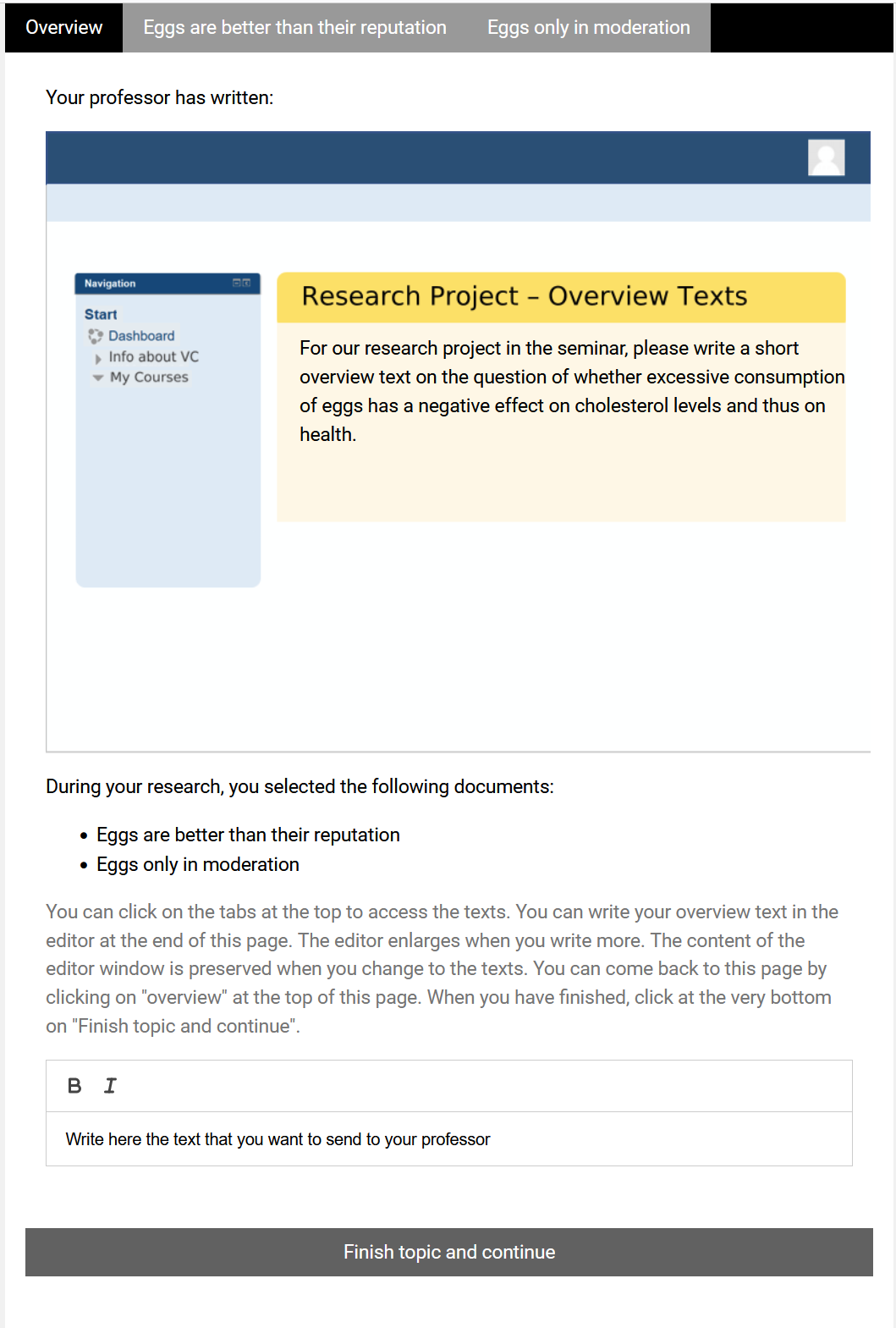Plain Language Summaries
Reading often begins with selecting what you want to read. If you research a question on the Internet, you will be offered a wide variety of documents from which you can make a selection for further reading. These documents may differ in terms of their suitability to your question. However, they often also differ in terms of the expertise of the author. For example, one author may have scientific expertise on the issue, while another author may have personal experiences with the topic or hold a personal opinion.
Reading also takes place in a wide variety of contexts. Students may read for university, for example, or they may read for a personal project. When they read for university, there are often expectations regarding the quality of the selected literature. For example, in a university context, students are often expected to prefer authors with scientific expertise. In a personal context, there are usually no such external expectations. Students can decide which sources they want to trust according to their own beliefs and values.

The aim of the study was to investigate the influence of different contexts on the selection of documents for further reading by students. Two experiments were conducted for this purpose. In the first experiment, two contexts were compared: a university context and a personal context. In the second experiment, a third context was examined: a personal context in which an external audience appreciated scientifically sound working methods. This second personal context was therefore intended to be closer to the university context.
In addition to the external context, the internal context was also examined, more precisely: the students' beliefs about science and their knowledge about how science works. It was assumed that both also influence the selection decisions.
Two online experiments were conducted. 165 students from the University of Bamberg took part in the first experiment and 125 in the second. The students were assigned to a condition when they registered for the experiment: In experiment 1 either the university context or the personal context, in experiment 2 the university context, the personal context, or the personal-plus-audience context.

In the university context, students were asked to imagine that they are reading texts on various issues as part of a seminar and writing a short text about them. Their professor would read the texts and their opinion would be important to them. The students in the personal context were told that they were preparing a podcast and that their best friend had suggested topics for it. They only write the texts for themselves. In the personal context with an audience, they were also asked to imagine that they were preparing a podcast etc. However, they were also told that they were writing the texts as show notes for the podcast, so their audience would read them, and that their audience would appreciate science and a scientific approach.
All groups were told that today they would initially only select texts that they would want to read later. They were then shown a search engine results page for four different questions, which showed the titles of documents and an author, including job title or other reference to the topic. They could select as many documents as they wanted from a list of ten to read later. The characteristic of interest in this selection was the source of the document, specifically: the experience of the author. Here, it was varied whether the authors had scientific expertise or personal experiences with the topic.
Regarding beliefs about science, the perceived utility of science and trust in science were recorded using questionnaires. A reaction time-based test of implicit attitudes was also carried out. Moreover, the students completed a multiple-choice test on their knowledge about how science works.
Both experiments were preregistered (https://doi.org/10.17605/OSF.IO/C47VH and https://doi.org/10.17605/OSF.IO/BVYD3).
As expected, the students in both experiments mainly selected sources with scientific expertise. However, there were context-dependent differences: In the personal context, students were more likely to select a source with personal experiences in both experiments. This probability was again significantly reduced in experiment 2 in the personal context with an audience. However, a comparison of the university context with the personal-plus-audience context also showed that there were still differences.
An influence of beliefs about science and knowledge about how science works was also demonstrated in both experiments: The more useful students thought science was, the more they trusted science and the more they knew, the less likely they were to choose sources with personal experiences. The more useful they considered personal experiences to be, the more likely they were to choose sources with personal experiences.
The data on which these results are based are published on the Open Science Framework (https://doi.org/10.17605/OSF.IO/BQ478 and https://doi.org/10.17605/OSF.IO/Y6U2J).
The results show that context plays a role in determining which documents or quality of sources students find acceptable. For school and university education, this means that it is not enough to provide students with knowledge about the evaluation of sources (e.g., to recognize whether an author has scientific expertise for the question). In non-academic contexts, people may choose other sources. However, the study also found that beliefs and knowledge have an influence on the selection of source regardless of the context. Therefore, if the aim is to encourage people to choose sources with appropriate expertise, regardless of whether this is explicitly expected of them or not, appropriate beliefs about science and knowledge about how science works hould be promoted.
Schoor, C., Rouet, J.-F., & Britt, M. A. (2024). Reading for University or for myself? Effects of context and beliefs about science on college students' document selection. Journal of Educational Psychology, 116(3), 317-345. https://doi.org/10.1037/edu0000849
The study was conducted within the project Contexts, which was funded by the German Research Foundation (DFG).